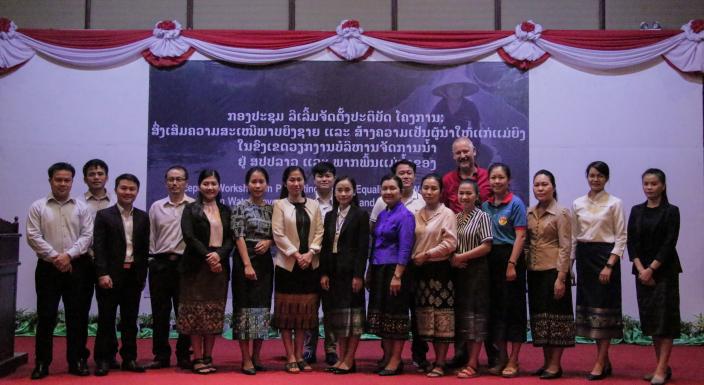On October 4, 2019, Oxfam in Laos celebrated the official launch of the Mekong River Water Governance (MRWGP) project, a collaboration between Oxfam and the Swiss Agency for Development and Cooperation (SDC) – in partnership with the Ministry of Natural Resources and Environment, the Gender Development Association (GDA), CLICK and the National University of Laos.
The project aims to promote gender equality and strengthen women’s leadership to increase inclusive decision-making on water governance in Lao PDR and the Mekong region, and also contributes to the SDC Mekong Strategy 2018-21, with a focus on governance and citizen’s participation.
‘In the Mekong region, women play important roles in the use and management of water and aquatic resources and are key contributors to their local economies’, explains Mr. Thibaut Hanquet, Country Director of Oxfam in Laos. ‘However, the contributions from girls and women towards water and natural resource management are often overlooked, minimized or ignored. This is why Oxfam aims to set and environment that promotes women’s leadership and participation in water governance’. The exclusion of women and girls in matters regarding to water and natural resources management perpetuates an environment where women and girls are unable to own and access assets, resources, and services that can contribute to increased income and food security.
Three main outcomes are the heart of the project 1) to promote the consideration of gender in water governance research and policies 2) to support joint research and reflection by civil society, local communities, and women’s groups on the gendered impacts of hydropower projects, and 3) to facilitate stronger links between emerging women leaders working on water governance in Lao PDR and the Mekong Region.
‘SDC appreciates the social inclusion part of the project, as well as its view to bring about dialogues consisting of various groups involved in water and natural resources management, says Mrs. Sayyabounsou Phouthamath, representative of SDC.
To achieve these outcomes Oxfam, SDC and partners will convene informal women worker groups, as well as multi-stakeholder dialogues and forums on water resources and governance, to discuss experiences, challenges, lessons learned and solutions for moving forward. Oxfam and SDC will also work with institutions such as the National University of Laos, which has recently launched two Masters programme in water governance, to better mainstream gender into the water governance curriculum.
Four drivers of gender equality and social inclusion have been identified by Oxfam from its experience in the region: the demonstration of leadership from water governance institutions by making gender equality and social inclusion a core goal, gender and social inclusion analysis-based decisions on water management, meaningful and inclusive participation and partnerships in decision making and changing discriminatory policies which cut women out of owning water and land resources. These drivers will be at the core of the Mekong River Water Governance Programme.
